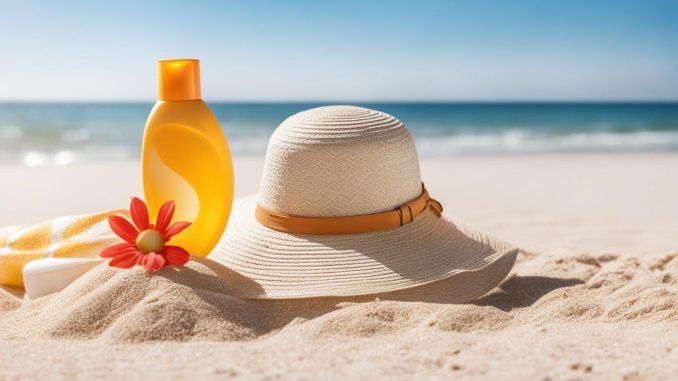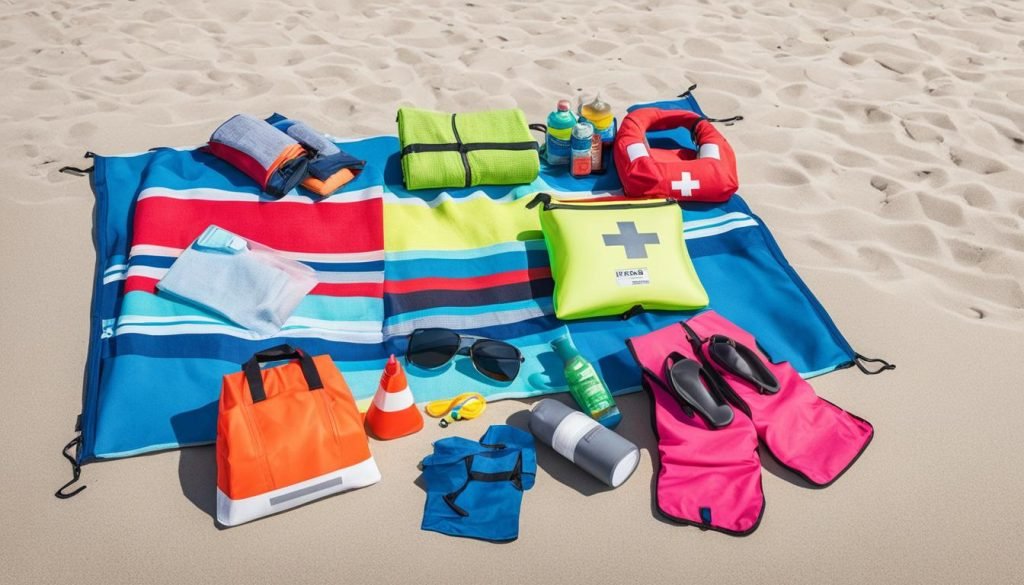
As the summer sun beckons families and friends to the shores, beach outings become a staple for fun and relaxation. Yet amid the laughter and the waves, it is critical not to overlook the importance of beach safety guidelines. From the serene appearance of a coastal horizon to the hidden currents beneath, the beach presents unique challenges that call for caution and preparedness.
Swimming safety cannot be taken for granted, especially in the unpredictable scenarios presented by open water safety. It’s a sobering reality that drowning prevention is necessary because the allure of the ocean can quickly turn perilous. Beach hazards don’t just lie in the deep – they can be found in the lack of preparedness or awareness of those who seek to enjoy the water’s edge.
Safeguarding yourself and your loved ones starts with knowledge and the right measures. In this guide, we delve into essential tips to mitigate risks and ensure that your coastal adventure remains memorable for all the right reasons.
Key Takeaways
- Learn the vital skill of swimming to significantly reduce drowning risks.
- Adhere to designated swimming areas supervised by lifeguards for enhanced safety.
- Stay vigilant about riptides, currents, and weather conditions before entering the water.
- Always choose to swim with a companion and utilize proper swim gear.
- Understand the implications of alcohol consumption on swimming abilities and safety.
- Use life vests for additional safety, regardless of swimming prowess.
- Keep an emergency plan ready for unforeseen situations while enjoying the beach.
Understanding and Preparing for Beach and Open Water Environments
When it comes to a day at the beach or enjoying open water activities, safety should always be the top priority. The joyful experience of swimming and playing by the shore can be safeguarded by understanding the environment and making careful preparations. The following insights and tips are dedicated to those planning to dip their toes into the waves, ensuring every splash is accompanied by an assurance of safety.

The Importance of Swimming in Designated Areas
Lifeguards with expert training stress the necessity to swim in designated areas, often marked by red and yellow flags, indicating their patrolling zones. It is these sections of the beach where swimmers can enjoy the water with an added layer of protection. Not only do designated areas assist lifeguards in keeping a vigilant eye on beachgoers, but they also usually signify regions that have been checked for potential hazards. Heeding warning signs is paramount, complying with lifeguard tips will mitigate risks and ensure a safer beach experience for everyone.
Assessing Weather and Water Conditions Before Swimming
Deceptive calm can often disguise treacherous currents, therefore, it is essential to assess weather conditions and water behaviour before committing to a swim. A glance at the sky and the sea’s surface can be telling—dark, deep water, foam moving seaward, and fewer breaking waves suggest dangerous rips, urging swimmers to stay vigilant. Especially on days when the surf is substantial, the might of rips escalates, and the importance of acknowledging these signs before swimming becomes a matter of life-saving importance.
Choosing the Right Swim Gear and Equipment
Selecting the appropriate open water gear is another critical aspect of swim safety preparations. From wetsuits that guard against cooler temperatures to sun protection preventing harmful UV rays, the right equipment can make all the difference. Essentials like proper swim attire and protection gear are not only about comfort—they play a substantial role in safeguarding against potential risks, both visible and invisible. Equip yourself with the knowledge and gear suitable for the conditions you’re facing to ensure a safe and pleasurable experience in the open waters.
- Always choose swim areas with lifeguard supervision.
- Prioritize safety by acknowledging all beach warning signs and flags.
- Observe and understand local water patterns and conditions.
- Equip yourself with the correct gear for temperature and protection.
- Take advantage of lifeguard tips and local knowledge.
Preventative Measures for a Safe Beach Experience
The allure of glistening waves and sun-kissed shores is undeniable, but a successful day at the beach depends on more than just perfect weather—it requires a commitment to safety. Optimal beach adventures are the result of respecting the water and understanding the potential hazards. This includes utilizing the swimming buddy system, recognizing rip currents, and steering clear of impairing substances like alcohol during water activities to ensure everyone’s well-being.
Swimming with a Buddy: The Life-saving Importance of Never Swimming Alone
A swim in the vastness of the ocean is best enjoyed with a partner. Employing the swimming buddy system is an essential practice that ensures someone is always actively keeping an eye out for potential dangers and ready to call for help, if necessary. Not only does this system reduce the risks of swimming mishaps, but it also enhances the overall enjoyment of the experience. Dr Andrew advises swimmers to recognize their limits, choose companions wisely, and wear appropriate flotation devices to further guarantee safety, particularly in unpredictable open water settings.
Recognizing and Reacting to Rip Currents and Other Hazards
Understanding rip current safety can be the difference between a close call and a tragedy. These swift channels of water are notorious for pulling swimmers away from the shore, making the ability to identify and react to them crucial. The best strategy in these situations is to stay calm, conserve energy, and swim parallel to the shoreline to escape the current’s grip. It’s just as important to be vigilant about other beach hazards, ranging from hazardous marine life to unexpected changes in the weather or water conditions, and seeking immediate aid when stung or injured.
Alcohol and Water Activities: A Dangerous Combination
In the context of beach and water recreation, alcohol impairment risks shouldn’t be underestimated. Alcohol can dramatically diminish a person’s ability to make sound judgments and react swiftly in crucial situations, which is why avoidance of such substances is strongly recommended during any water activity. Safeguarding the beach experience is about making responsible choices—this includes recognizing that the effects of alcohol are exacerbated in the sun and near water, thus prioritizing water activity safety above all.
Leave a Reply